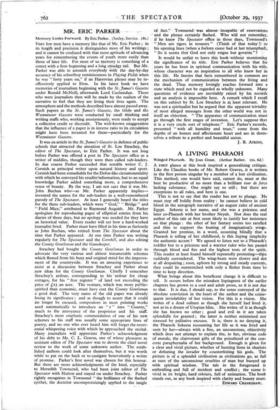A LIVING PHARAOH
Winged Pharaoh. By Joan Grant. (Arthur Barker. ios. 6d.)
A FIRST glance at this book inspired a generalising critique. Like the Claudius books of Mr. Robert Graves, it is written in the first person singular by a member of a lost civilisation. This method, one would have said, cannot do, must at the best be productive of no more than a brilliant tour de force lacking substance. One might say so still ; but there are exceptions to all rules, and here is one.
This is not to say that the reader has _not to plunge. He must step off boldly. from reality : he cannot believe in cold blood in the autograph narrative of an august ruler of ancient Egypt. Sekeeta is her name, and she was a priestess and later co-Pharaoh with her brother Neyah. Nor. does the real author of this tale at first seem likely to justify her insistence on that plunge : the ether of her fantasy seems too rarefied and thin to support the beating of imagination!fs.. wings. Granted her premise, in a word, assuming blindly that: a Pharaoh is telling of het childhobd; is this lisping Simplicity the authentic accent ? We agreed to listen not to Pharaoh's toddler but to a priestess and a warrior ruler who has pasSed through blood and fire and the highest tests of the spirit. This reader at least found himself repeatedly proteating,
suddenly surrendered. The wing-beats were slower and ot at all despairing ; soon, upborn by strong and steady currents, they could lie outstretched with only a flicker from time to time to keep direction.
What brings about this beneficent change it is difficult to tell. It occurs before the mistaken lispingneia of the earlier chapters has grown to a cool and adult prose,. so it is not due to that. It is due, I should say, to the sense conveyed of the absolute conviction in the heart of the author and the conse- quent inviolability of her vision. For this is a vision. She writes Of a dead culture as though she herself had lived it, not as: n a dream of Utopian bliss. '..She writes of it as though she has known no other ; good and evil in it are taken splendidly for granted ; the latter is neither minimised nor stressed . by palliative excuses. It is, there is no denying it, the' Pharaoh Sekeeta recounting her life as it was lived and seen by her—always with a fine, an unconscious, Objectivity which does not attempt to explain the, to her, obvious code Of it-totals; the clairvoyant gifts of the priesthood or the con- crete paraphernalia of her background. • Enough is given for a clear and' vivid picture, whether of hunting' lions in chatiots or defeating the invader by counterfeiting his gods. The picture is of a splendid civilisation as civilisations go, as full as ours of the unconscious cruelties of 'man but buoyed up with spiritual wisdom. The tale in the foreground is enthralling and full of incident and conflict ; the scene is vivid in its bright, hard Monts, full of animation. The book stands out, as any book inspired with clarity and beauty must.
EDWARD CRANICSHAW.


























































 Previous page
Previous page